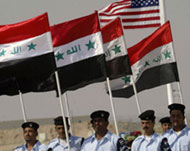Baghdad set for security revamp
In an attempt to curb sectarian violence, Iraq’s government plans to restructure the capital’s security forces by putting all police officers and paramilitary soldiers under one commander.

Iraqis in the new National Police force would wear a newly designed uniform and drive similar patrol cars, said Colonel Ali Rashid, a police supervisor at the ministry of interior on Thursday.
Rashid said the reorganisation, first reported in The New York Times, would begin soon.
Meanwhile, a roadside bomb targeting municipal workers exploded in western Baghdad, killing five of them and wounding two, police First Lieutenant Thaeir Mahmoud said.
Crrently, Baghdad is filled with tens of thousands of police officers, soldiers and paramilitary troops whose identities and allegiances often are not known.
In addition to widespread attacks by mainly Sunni Arab-led anti-US fighters who also oppose the US-backed Iraqi government, Baghdad is rife with Shia militias and death squads that carry out sectarian reprisal killings, often dumping the bodies of their tortured victims on city streets.
Police uniform
In many cases, witnesses and authorities say such attacks are carried out by men wearing police uniforms, leading Sunni Arabs to argue that Iraq‘s Shia-led interior ministry condones the violence.
The interior ministry controls police forces, the ministry of defence is responsible for the army, and paramilitary forces that guard infrastructure such as oil pipelines and electrical plants are often under the control of other ministries.
 |
|
Fighters view US-trained |
Iraq‘s army, which works closely with US forces in Baghdad, will not be affected by the formation of the National Police force, Rashid said.
The need for such a reform is obvious in Baghdad, where increased sectarian killings have caused many Sunnis and Shia to flee from their homes, or to guard their neighbourhoods.
Residents often do not know whether the police they see on the streets are officers or impersonators planning to kidnap or kill them.
Police, paramilitary forces and Iraqi soldiers wear a wide variety of uniforms. Some appear in a combination of civilian and work clothes. Government officials have been saying for the past year that this problem must be addressed.
Plea for unity
On Wednesday, Jalal Talabani, the president, urged Iraq‘s feuding factions to unite against violence, as the government reported 952 people were killed nationwide last month in “terrorist” violence – most of them civilians.
Talabani, a former Kurdish guerrilla commander, said Iraqis feel “shock, dismay and anger” at the slaughter.
Attacks on police and the army have been rising as they are viewed by armed opponents as collaborators trained by the US forces.
Condemnation
“What is asked of the political parties is that they strenuously and clearly condemn these crimes, regardless of who the perpetrators are,” Talabani said in a statement on Wednesday.
“Clerics – be they Muslim, Christians, Shia or Sunni – from all factions should also issue edicts rejecting these acts.”
Figures from the ministries of health and interior said that during April, 686 civilians were killed in politically motivated violence, along with 190 fighters, 54 police officers and 22 Iraqi soldiers.
Eighty-two multinational force personnel – including 76 Americans, three Italians, one Romanian, one British and one Australian – died in Iraq during the same period.